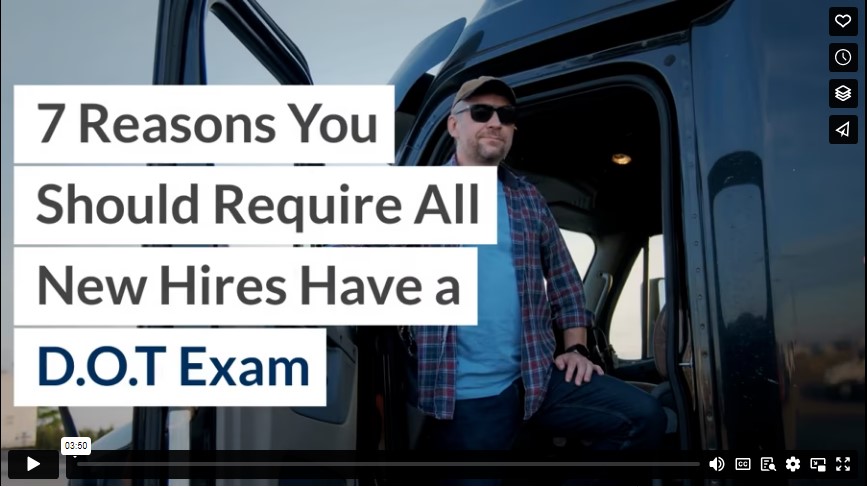7 Reasons You Should Require All New Hires Have a DOT Exam
The hiring process is an investment in time and money. It drags you away from profit-producing activities and starts a round of training for the new hire. As the new employee learns the ropes, they may work slower. And they often shadow your best employees, who must also slow down to train the newbie. Hiring a new employee at a trucking company also requires more documentation because of Department of Transportation regulations.
Does a Driver Need a New Certificate if They Change Jobs?
When existing CDL operators transfer from one job or company to another, the drivers technically are not required by federal law to pass another DOT medical exam. The certificate can be transferred from the old employer to the new one. On the other hand, an initial physical exam can be beneficial to their new employer. Trucking companies can get ahead on DOT medical card requirements, screen new hires better, and get a jump on the required documentation.
As more trucking companies take the proactive approach, you may wonder if you should follow the trend. Here are some reasons you may consider adding the DOT exam to your pre-hiring process.
- 24 Months Worry-Free: As an employer, you likely manage multiple employees, all with different DOT medical card renewal dates. It would be understandable if someone fell through the cracks, but a compliance audit could still mean trouble. If a driver is caught with an expired DOT medical card, the violation carries a heavy fine. If a new hire employee only has a couple of months left on their medical card before their two-year renewal, you or your new employee will need to schedule the exam in a few weeks anyway. By making it part of the pre-hire requirements, you get the formalities out of the way and have two years before you need to worry about it again.
- Employer Liability: While a new employer isn’t required to request a new physical, by not asking for a more recent physical, you take all the responsibility and liability should there be problems. Adding the exam to the pre-hire checklist protects your company from any errors made by the driver’s last boss or medical examiner.
- Driver Health: The exam is designed to screen drivers for physical or mental problems that make them a danger on the road. Their health might have changed if it’s been eighteen months since their exam. By having the driver get a DOT physical before you hire them, you won’t have any surprises. You won’t put months into training someone who can no longer pass the physical. You won’t have to start the hiring process again. You protect both your driver and the public while also preventing costly liability claims.
- Medical Leave: The medical certificate only proves the driver was healthy and fit enough to drive commercial vehicles at the date of the last exam. Unfortunately, health changes with time. The driver could have been injured off the job. If the driver took time off work for a physical injury or mental illness, and neither the driver nor the previous employer told you about it, an exam would give you a heads-up before any unfortunate incidents.
- Recent Drug Test: With recreational marijuana legal in many states, drivers have easier access to federally banned substances than ever before. A recent drug test protects your company from lawsuits, your driver’s life, and the safety of the surrounding neighborhoods.
- DOT-Compliant Driver File: The FMCSA requires employers to create and maintain a complete driver file for every driver containing specific documents. Suppose your company is selected for a Department Of Transportation compliance audit. In that case, you know your drivers passed the exam and that you have the most recent copy of their medical certificate.
- Sets The Tone: Drivers expected to get an exam at the onset of employment know that their new employer will need them to be on the ball when it comes to DOT-regulated requirements and documentation. It also sets a precedent, so they accept random drug tests as part of an ongoing compliance protocol.
Hiring a driver who is current on their DOT physical exam requirements may seem like a hiring bonus to an employer. However, there are benefits to asking new hires to go through the process to recertify their physical fitness before they join your team and get behind the wheel. Legally and logistically it can be a smart move.
Video


